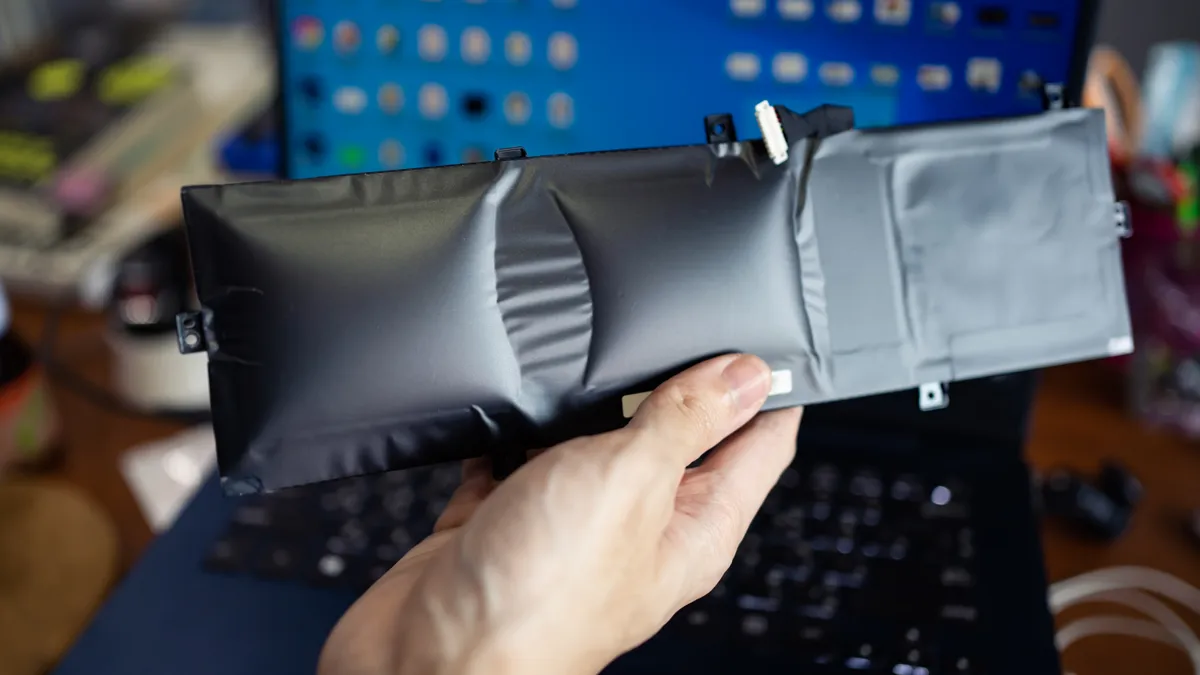Dive Brief:
- A bill to expand New Hampshire’s battery and electronics disposal and incineration ban is headed to Gov. Chris Sununu’s desk, a move meant to prevent more fires at waste and recycling facilities. The state legislature approved HB 1386 last week.
- New Hampshire’s current law already bans some types of batteries and electronics from landfills and incinerators, including wet-cell batteries and computer CPUs and video displays. The new bill would expand that ban to specifically target lithium-ion batteries and “any electronic device.”
- The bill would require owners and operators of facilities such as landfills, incinerators, waste-to-energy plants and composting facilities to post informational or warning signs about the ban. The bill also calls for more public outreach and education for residents.
Dive Insight:
New Hampshire is the latest state poised to pass battery disposal and management legislation this year. Such legislation has gained popularity across the country as fires, particularly those caused by lithium-ion batteries, continue to cause safety issues at recycling and waste facilities.
The bill has wide support from waste and recycling groups, including the National Waste & Recycling Association’s state chapter. “Besides recycling facilities, these batteries are a threat to the entire solid waste and recycling system, from collection to disposal, and impact our members facilities every day,” said Lew Dubuque, vice president of chapter relations, in written testimony. NWRA’s members in New Hampshire include Best Way Disposal, Casella Waste Systems, Republic Services, WM, WIN Waste Innovations and others.
In an email, Casella spokesperson Jeff Weld called the bill “a common sense piece of legislation that will help to raise awareness of the dangers of improper disposal of lithium-ion batteries, and ultimately will keep people in our industry safe to do their jobs effectively.”
Lithium-ion batteries have caused or are suspected of causing numerous fires at New Hampshire facilities in the past few years, including one that resulted in “considerable structural damage” to the transfer station in the city of Keene, according to the Northeast Resource Recovery Association. NRRA does not take a position on legislation but has testified during the bill process about the batteries’ impacts. Such fires have also caused problems in neighboring states, said Reagan Bissonnette, NRRA’s executive director.
According to the bill, the addition of new electronic items to the disposal ban will likely “increase state, county and local expenditures by an indeterminate amount to the extent they provide waste management and recycling services.” NHDES is not yet able to determine how much costs could go up or “the overall quantity of ‘new’ electronic waste that would be recycled,” the bill states.
New Hampshire currently has several options for battery and electronics disposal, including through Call2Recycle, a group that does not take positions on legislation but monitors battery disposal bans and battery EPR bills throughout the country.
“This is an opportunity for industry and for government stakeholders to work together to help compliantly and safely get more batteries recycled,” said Todd Ellis, managing director at Call2Recycle.
Ellis said several states have used disposal bans as a stepping stone to implement a wider battery EPR program, a trend Call2Recycle estimates could continue in coming years.
Other locations with battery and electronics disposal bans include Seattle, which enacted its law in January, ahead of Washington’s battery EPR law set to take effect in 2027. Washington, D.C., also has a disposal ban in place as part of its battery EPR law.
Meanwhile, Illinois’ legislature recently approved an EPR bill for small and medium batteries, which awaits Gov. J.B. Pritzker’s signature. That bill also received wide industry support.
In May, Vermont expanded its EPR program for household batteries by approving a bill adding rechargeable, removable and some medium-format types. And in January, New Jersey enacted an EPR law for electric and hybrid vehicle batteries, the first state to establish such a program. In 2022, California established its EPR program for a range of single-use and rechargeable batteries.
These new laws will also mean a higher demand for battery recycling infrastructure and investment, Ellis said. Call2Recycle expects about 61 million people to live in states with battery EPR or “all-battery requirement” laws by 2027. “There's a large volume of batteries that will soon come under regulation, which will give consumers more opportunity to recycle these batteries.”















